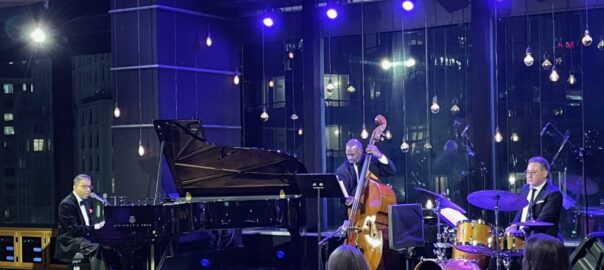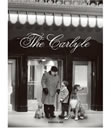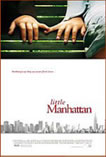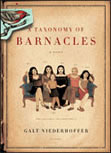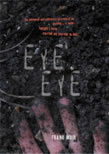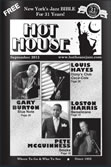The New York Observer, by Spencer Morgan, December 16, 2008
Spend a weekend at the Carlyle Hotel on Madison Avenue and East 76th Street. You have to listen closely.
Bop, bop bop. Bop, bop bop. Around 8:30, Friday night at the Café Carlyle, home of the legendary late lounge singer Bobby Short, the five-piece band was getting the ball rolling for the room’s new star, Steve Tyrell. He waited for the right moment, then eased the mike from its cradle.
“The look of love is in your eyes,” he sang in a gruff Southern accent. Mr. Tyrell had the look of someone who might have been stout before slimming down. He wore a velvet blazer, starched white shirt and a white polka dot silk scarf. His hair, silvery white, stood up on its own. Two backup singers loomed, a bodacious Asian woman and a lanky black guy with a gray ponytail and an earring.
“Ooooh,” sang the lady.
“Woahhh,” sang the man.
“Say a little prayer for you!” sang Mr. Tyrell.
A decidedly New York woman at the bar snapped her fingers. Her wrists were adorned with bracelets made of silver balls. More silver balls hung about her neck, and a ball on each ear lobe.
“I’m gonna send this out to my friends Les and Julie, I think you guys are out there somewhere,” said Mr. Tyrell, and then worked his way through “This Guy’s in Love With You.” Next was “Walk on By.”
“I haven’t heard this in forever,” said the silver-ball lady.
The room was dominated by men in suits and ties. A shortish fellow with a thick mustache and coarse, swept-back hair that resembled a shoe brush tapped his gimlet glass with a plastic stir stick. The room looked clean, fancy; $150 for a seat.
“I’m going to sing a song I sung in a movie called Father of the Bride, and it changed my life,” said Mr. Tyrell. He said he was going to sing it for Julie Chen, “the most beautiful woman on television. Kim Novak had nothing on you.”
“Hey, would you stop flirting with my wife?” joked CBS president Les Moonves.
Later Mr. Tyrell dropped by the table.
“It’s a Friday night in December,” said Mr. Moonves, “where the economy’s bad and restaurants are half-empty-and this room, which is not an inexpensive room, is still packed. I think it’s terrific for New York, I think it’s terrific for the country, I think it’s terrific for the entertainment business.”
But as Loston Harris, the pianist and singer at the hotel’s Bemelmans Bar, likes to say, the Café is the show but Bemelmans is where it’s happening. Before I could get there, I was struck by a fur hat. Renee Karrat, 32, who works at Ralph Lauren, was in the lobby. She had dropped by the bar after dinner to continue celebrating her brother’s birthday, but it was too packed. They headed off to drink Champagne at a friend’s room at the Hotel at Rivington.
Over at Bemelmans, an elegant old string bean in a tailored blue blazer was huddling with Mr. Harris, speaking in hushed tones. I gathered from Mr. Harris’ eyes that the man might have been speaking gibberish.
Scrunched around a two-top were Chris Singerman, 28, a banker with SwedBank, and a couple of friends. The bank had actually just made a few hires. Mr. Singerman had been talking about spending New Year’s Eve at Bemelmans, “’cause there’s nothing else going on.”
“It’s between this and seeing My Morning Jacket at Madison Square Garden,” said Mr. Singerman, who was swimming in a Carlyle blazer provided at the door. As was his friend Samit Mody, who works in commercial real estate: “You’re either treading water, or you’re not.” They had come on a whim: After a Christmas party at Bilboquet on East 63rd Street, Cate Candler, 32, an executive at Cole Haan, had suggested they continue the merriment at the Carlyle, a Candler family favorite.
There was hardly any standing room around the bar. A slick-looking fellow and a Botoxed blonde were nuzzling among the camel hair and tweed. Ms. Candler said the holiday spirit appeared to be intact at the Carlyle. But, she cautioned, “people take comfort in going out during the holidays because it feels comfortable.”
Was there an added dash of hope in the air?
“I’m hopeful,” said Mr. Singerman. “I have hope.”
“If only these walls could talk, man,” said Loston Harris between sets. “People are saying, we’re escaping, that you help us to take our mind off what’s going on. This is a special clientele. I’m not a stockbroker, but I’m assuming these people are losing tens of millions of dollars-that can’t feel good. There are a lot of cheaper ways to unwind. But they choose to come here because they love the music. People need music now more than ever.”
“This is a place people come to forget-so it’s really hard to tell,” said a dignified bald bartender in a regal vest.
Back at the bar, a gent named Michael, who said he works for a debt restitution firm, said the place seemed unscathed by the recession. He lives in Palm Beach, was in town for a Sunday meeting. He said it’s a buyer’s market for those in the credit trade: Four cents on the dollar instead of ten. “Come to think of it, I think it’s more packed in here than I’ve ever seen it.”
The crowd was getting louder. Eyes turned away from the slick dude and Botoxed blonde, who were back from the night before and being gross.
An investment banker named Sinclair said he liked the candles. He was rubbing the hand of his pretty girlfriend Amanda. “We were just talking about the Titanic and how the ship was sinking and everyone kept partying as the ship sank into that bitter cold water,” he said.
“I’m only buying shotgun shells and potable water,” he added. “And food!” Later, they zoomed off on his Ducati.
Another young couple-she in white spotted fur, he in gray tweed overcoat-made a beeline for the door. I gave chase. Had the young man’s credit card been rejected? Was he itching to splurge on Champagne and hotel sheets? They walked through the revolving door into a vacated yellow cab whose door was left ajar by the previous fare who had already swept into the hotel.
A tinkling sound blew up from the south: Oktay Urga, 24, one month off the boat from Istanbul, sweating under a knit cap, said a couple had paid him $30 to chug them up from 42nd Street in his pedicab.
“This job is not good, sir. It is a lucky job. One day I make 50, the other guy say he make 300. I don’t want this job, but I have to take it.”
He wants to get his master’s in public administration.
“I am Kurdish. It is not good for me there. Every time the teacher looks the exam and sees I am Kurdish, he fail me. They are always watching. They want to kill me.”
Sunday night. On the way uptown my taxi driver asked if I’d heard about the guy throwing his shoes at President Bush. “This is very embarrassing for Bush,” he said. I said that it was more embarrassing for the guy who threw his shoes. As we pulled up at the Carlyle, he said America should feel embarrassed about thinking it was a good idea to go around invading other countries. The awning of the Carlyle was impossibly clean-looking, as if someone had steam-pressed it. A bundled-up elderly couple passed; the woman said to her husband: “I hear even they had a huge sale, and sold everything.”
Inside, Cynthia and Wayne Davis, of Charleston, S.C., were celebrating their 36th anniversary.
“The city is packed! Where’s the recession?,” said Mrs. Davis. She wore a green silk blouse; her wrists and ears and neck glittered with gold and diamonds. She said they come here every year “to fall in love all over again.”
“This is a city of romance and vibrancy and character,” she said. On her fingers she counted off the various department stores she had visited over the weekend, and said the whole time she was asking herself, “Where’s the recession? Now I don’t know if people were buying anything.”
Mr. Davis, who is in “international transportation,” said, “It brings out the best of us. This is the most romantic city in the-“
“He’s the most romantic man in the world. He really-“
“No, but it’s really about the romance and the laughter.”
“Doesn’t he look like Robert Wagner? And don’t I look a little like Shirley MacLaine? She’s my great aunt, you know,” said Mrs. Davis, nodding.
“Yeah, but I love you more,” said Mr. Davis. “I loved you more yesterday, but I think I love you even more today.” One of the gifts he’d purchased for his wife that day was a candle at St. Patrick’s Cathedral.
“We lit a candle for lost souls,” he said. “Now more than ever is a time to pray for lost souls.”
THE NEXT DAY I spoke with the hotel’s general manager, James McBride, who was in Dix Bay huddling with Rosewood executives about next year’s budget for their resorts in the Caribbean. He said business at the Carlyle was up 8 percent on the year. Last weekend both the $15,000-a-night Empire suite, which occupies both the 28th and 29th floors, and room 1812, where Jackie O. used to live ($5,000 a night), were occupied.
Monday night. Woody Allen on the clarinet at Café Carlyle. The show has been sold out every night this season, just like it has been for the last decade. Tickets are $150; $70 for standing room.
The couple sitting across from me was from Jacksonville, Fla. They visit New York every year. “We finally decided to splurge,” the man said. Earlier that afternoon, he’d bought a sweater, which at 40 percent off was still more money than he would normally have spent on a sweater For dinner, he and his wife each had the $55 Dover sole.
Woody took the stage. Silence as he quickly peeled off a brown sweater and pieced together his old clarinet, his head down. He softly suggested “When I Grow Too Old to Dream” to the banjo player, who passed the message along to the rest of the band. Once the music got going, it didn’t stop, save for a few brief pauses between songs. Woody’s cheeks inflated to what appeared to be half of his body size. The actress Stockard Channing sat staring and smiling.
After the show I spoke with Woody.
“We’ve been doing it for, I don’t know, 35 years or something, 40 years, and we just enjoy playing,” he said. “We’d be happy to play in our living room for ourselves-at least I would be-but the band likes to play for people, so I play for people. “
Anything to say about the recession’s impact on New York?
“I haven’t noticed it yet,” he said. “I’m sure during the upcoming year, it’ll hit, and I’m not looking forward to it.”
“Mr. Allen, can I just shake your hand?” a woman interjected.
“Sure, but don’t get ink on you.”
I spoke to the great Elaine Stritch, who lives in the hotel in a large, corner, one-room apartment-what would be called a “bed sit”-on the lobby phone.
“Walk up and down Madison Avenue and there are a lot of empty storefronts, places that are for rent, that’s what scares me,” she said when I asked about the recession. But! Sure, some Broadway shows are closing, but that might not be all bad. “We need more shinola and less shit,” she said. “All due respect to the Disney Company, but you know, they could cool it a little.
“I think a lot of people are going to come out of this better off,” she continued. “I think it’ll be good for people to have to go through this and make sacrifices and come out on the other side. And maybe, hopefully, people will start to care a little more about their fellow man than they did before. And they’ll start helping their fellow man and then maybe they can start feeling better about themselves. We’ve got to help each other out, you know, it’s the only way.”

